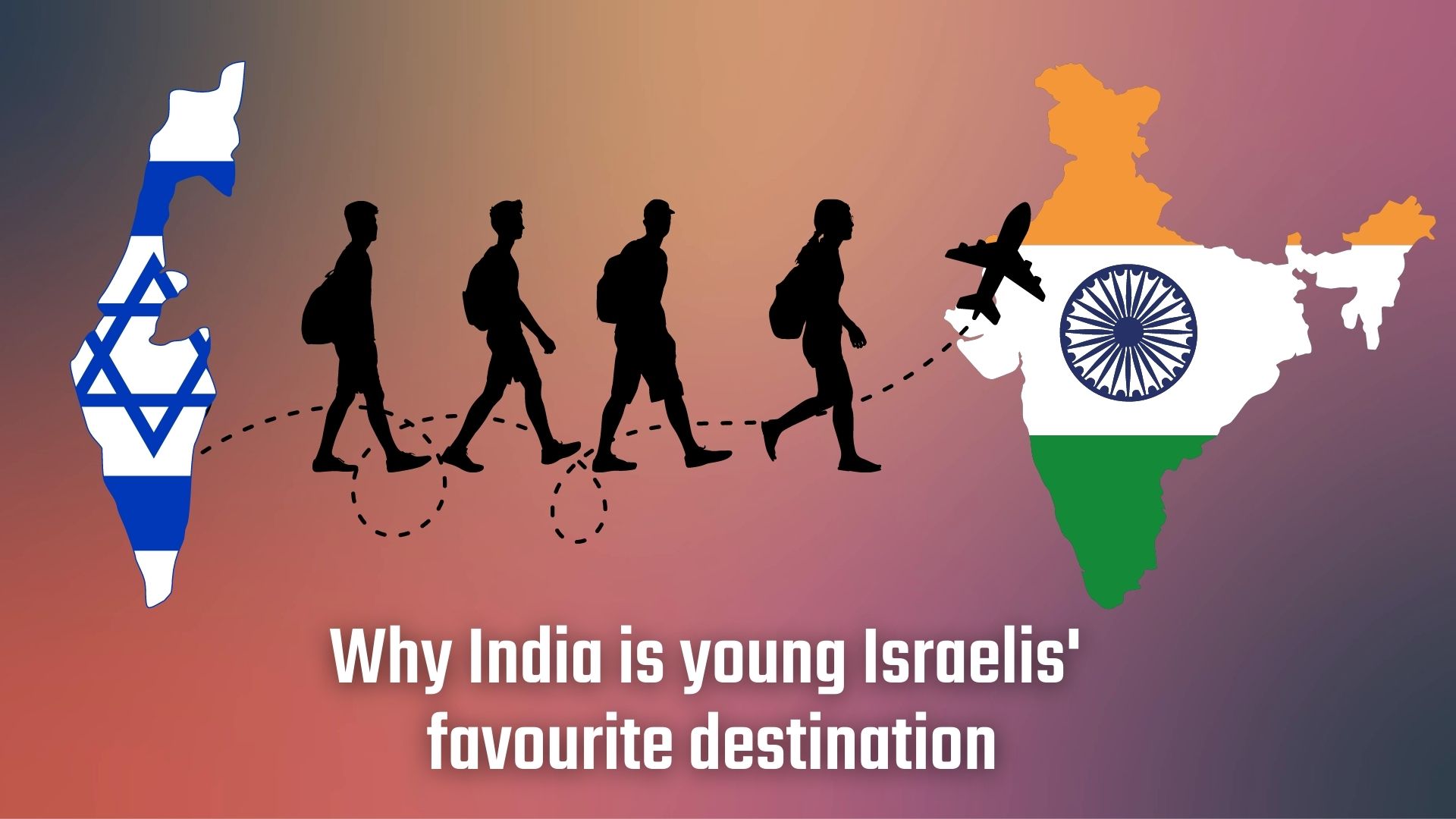
Young, fair-skinned, blue-eyed, dreadlocked hair, bodies pierced and inked with tattoos, and dressed in loose apparels – these are some of their usual marks of identities.
Yes, I am talking about young Israeli backpackers in India.
I noted this remarkable presence of young Israelis on my trips to Pushkar, Kasol, and Kodaikanal. They are a common sight in places across India.
In fact, it has reached to such an extent that shops now have boards in Hebrew script and food joints that serve Israeli food. It is these massive numbers of young Israelis in India that has also created a mini-industry that now dedicatedly caters to them in the country.
Did you know that as many as seven special flights had to be operated to carry Israelis stuck in India during the 2020 lockdown induced by the global coronavirus pandemic?
So, why do young Israelis visit India in such large numbers?
I tried to look for the answers and here’s what I collated:
Israelis in India: What do numbers say
According to the estimates of the Israeli Embassy in Delhi, some 80,000 Israelis visit India each year. A number which is apparently growing. This is a significant figure for a country like Israel which has a total population of only about 9 million.
What are the demographics of Israelis who travel to India
A major chunk of Israelis who visit India comprise young boys and girls, freshly released from their compulsory military service in Israel (Yes, all Israelis above 18, barring few exceptions, have to mandatorily serve in the Israeli military for a minimum of 2-3 years).
That’s why most of the Israelis that you would come across in India are relatively younger i.e. in their 20s or 30s.
Why do young Israelis visit India after completing their compulsory military service
These young Israelis have been coming to India for a few decades now. Why? After the rigorous years in military service, many of them prefer to take a few months’ break before moving on with their respective lives – starting on new jobs or further education.
For most of these young Israelis, this post-military service ‘break’ means backpacking and travelling abroad. More often than not, their destination is India.
India appears to be an ideal place for these young Israeli boys and girls to decompress themselves.
Why India is the preferred choice of young Israelis
India, it seems, ticks all the boxes that are required to become an attractive destination for young Israelis to travel.
India is a conflict-free place
After witnessing violence and war in their military-service (read Israel-Palestine conflict for context), young Israelis would naturally want to de-stress at a place that is peaceful and conflict-free. India, which is not engaged in any active battle, appears as a safe place to travel.
India offers yoga, spirituality and hashish
Serving in the military can take a serious toll on the mental health of young recruits. Having to see and fight in combative missions can be traumatic. To overcome the gruelling sights of the warzone, many young Israelis flock to India in search of spirituality.
Many Israelis enrol themselves in yoga and meditation ashrams to seek peace of mind. Similarly, many young Israelis find India an ideal place to blow off steam and smoke high-quality marijuana or hash.
India is cheap and easily accessible for young Israelis
Having saved money during their military tenure, they travel to a place that can prove economical. This is because young Israelis, on their post-military breaks, usually travel for a longer span.
One shekel (currency of Israel) is about 22 Indian rupees. Therefore, India gives the right value for money to sustain young Israelis financially in their months-long backpacking.
Another key point that makes India such a viable place to travel for young Israelis is India’s easily accessible for them. Israelis only require an e-visa to visit India.
The travel duration between India and Israel is only six hours via flight and the flight connectivity is regular and inexpensive.
Friendly cultural and diplomatic relations
Unlike larger parts of the world, India has remained immune to the antisemitic movements. Israelis do not have to encounter hate or hostility in India. Rather, they are welcomed as guests. Such hospitality makes India a favoured destination for young Israelis.
Due to historical reasons, while Israel has rough relations with a large number of countries, India is one country that has close ties with Israel. This may also be one of the reasons for the large number of young Israelis in India.
Vibrant natural landscape
From snowy mountains and beaches to lush green forests and desert, India is home to a diverse set of landscapes. Getting such different types of natural sites in a single country makes India such an attractive option for young Israelis.
Which places in India see a large influx of young Israelis
To know about the places frequented by young Israelis in India, you must first understand the fascinating concept of ‘the hummus trail’.
Hummus trail in India
The travel route frequented by Israelis is sometimes denoted as ‘The Hummus Trail’. Hummus is a thick paste or spread made from ground chickpeas and sesame seeds, made predominantly in the Middle East.
The hummus trail is often dubbed as the rite of passage for the post-army abroad trip for young Israelis. It comprises places that are flocked by many Israelis.
In India, the path covered by young Israelis is sometimes also called the hashish trail because of their high consumption of recreational drugs like hash. The places their trail in India covers Kasol, Kodaikanal, Goa, Hampi, Gokarna, Rishikesh, Varanasi, Pushkar, Almora, Dharamkot and, more recently, the Andaman Islands.
Many of these places now have ‘little Israels’ sprung up which are essentially small localities with high concentration of Israeli visitors. And Israelis meeting other Israelis is a common sight on the humus trail.
Kasol
Kasol is one of the most popular and oldest places in the hummus trail of young Israelis in India.
You can see local businesses in Kasol holding sign boards in Hebrew. It is even said to have a jewish prayer house. A cafe in Kasol had, in fact, hit headlines when it became so exclusive to Israelis that it refused entry to Indians.
The reason for Kasol’s popularity among young Israelis is the easy availability of organic marijuana and hash. These drugs are grown in the surrounding mountains. When I was travelling in Kasol, locals told me that earlier young Israelis regularly hosted trance parties.
Kodaikanal
The South Indian hill station of Kodaikanal has become another major congregation spot for young Israelis in India.
Vattakanal area of Kodaikanal has an Israeli colony. Israelis there actually run a mini-industry. I saw guest houses, travel agents, taxi drivers, food joints, etc whose businesses are solely dependent on these Israelis.
Another set of people who make a living out of Israelis there are the drug dealers. Kodaikanal is known for its ‘magical’ mushrooms or shrooms that give a high that attracts Israelis here.
Pushkar
Similar to Kasol and Kodaikanal, I saw Israelis exert a palpable influence in Pushkar as well. Shops here have sign boards in Hebrew and many restaurants only cater Israeli cuisine.
Seeing so many foot joints selling falafel, it is here that I had my first taste of the Israeli snack. The falafels here come in the form of a roll which is very different from the original Israeli falafel. It is basically an Indian adaptation of the Israeli snack.
Dharamkot
The quaint hamlet of Dharamkot near McLeodganj is another place where I saw good numbers of Israelis. Leisure and yoga classes were the main activity areas of Israelis in Dharamkot, as per my observation.
Darker side of young Israelis’ trip to India
The Indian adventure of young Israelis, unfortunately, also has a darker side to it. Last few years have seen cases of ‘missing’ Israelis on the hummus trail.
Mystery related to some of these ‘missing’ cases have remained unsolved. Nobody knows if they are dead or alive. Did they get lost in the valley and die? Were they killed by the locals? Did they deliberately ‘get lost’?
High drug consumption causes mental breakdown to at least 2000 young Israelis every year. This phenomenon is commonly referred to as “flipping out” or “the post army India meltdown”.
This crisis has moved the Israeli government to make a policy in partnership with the Indian government where outposts run by the Israeli Anti-Drug Authority have been set up on the hummus trail in India.
Other countries preferred by young Israelis
Apart from India, countries in South and Central America (like Brazil, Argentina, Chile, Peru, etc), as well as Southeast Asian nations (Thailand, Vietnam, Cambodia, etc) are also among the favourites of young Israelis.
But due to certain cases of antisemitism, there is still some level of hesitation among young Israelis in visiting these countries. India, on the other hand, is generally free from such prejudices against Israelis.
Therefore, travelling India has become somewhat ingrained in the route of young Israeli backpackers.
Upon their return to Israel, they discuss their India experiences, which diffuses a desire among others to travel to India. A trend has been established.
After years of excursion in India, Israelis have developed a unique style of travelling. Unlike travellers from other countries, who use guidebooks and the internet to plan their trips in India, Israelis depend on the feedback, information, tips and recommendations of fellow Israeli travellers. There are dedicated Facebook groups that have become helpful forums for Israelis to share information about travelling in India.
Years after their post-military trips, when they are settled with families, many Israelis also come back to India to relive their past experiences in the country.
